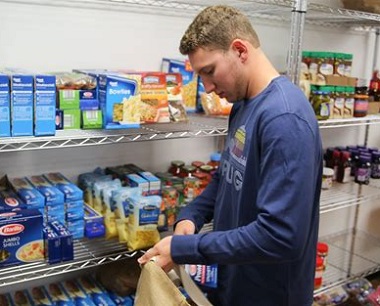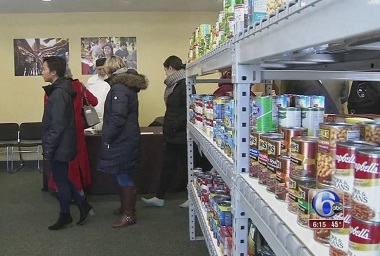 Creating Conversation is a weekly editorial, curated by the Centre for Missional Leadership (CML), which gives opportunity for people to speak about issues they believe are vital for the church in Vancouver.
Creating Conversation is a weekly editorial, curated by the Centre for Missional Leadership (CML), which gives opportunity for people to speak about issues they believe are vital for the church in Vancouver.
One of the goals of this weekly article is to spark dialogue – and action. We invite you to join the dialogue here on the Church for Vancouver website.
We also invite you to use the article as a discussion starter with your small group, church staff, friends and your neighbours. Thanks for participating in the conversation!
For the kingdom of God is . . . righteousness, peace and joy in the Holy Spirit. Romans 14:17
As we settle into the newness of 2023, ending one year and moving into a year that is yet to be experienced, we can play an important part in expanding God’s realm of righteousness, peace and joy that is for all people. We can pursue the things of God that make for peace and mutual encouragement which results in that holy gift of joy.
Lately, in my role as Chaplain at St. Andrew’s Hall on the UBC campus, I’ve been reflecting on how to help university students experience God’s loving care for them when they have come to me sharing their struggles with food insecurity and related problems.
We know that eating together as a family and/or with friends is vital for wellbeing. Throughout the gospels, we read that Jesus dined with people from all walks of life and that he used mealtimes to engage with people – teaching them, encouraging them, showing love for them and allowing time for mutual exchange.
Food insecurity and students
 Knowing all the benefits of eating together, I was sad to read in the UBC Student Affordability Task Force Report and Recommendations that “30 – 40 percent of students at Canadian higher education institutions experience some degree of food insecurity and that equity-deserving groups are disproportionally affected.”
Knowing all the benefits of eating together, I was sad to read in the UBC Student Affordability Task Force Report and Recommendations that “30 – 40 percent of students at Canadian higher education institutions experience some degree of food insecurity and that equity-deserving groups are disproportionally affected.”
At UBC’s Vancouver campus, as of September 2022, over 35 percent of undergraduates experienced food insecurity, meaning “inadequate or insecure access to food due to financial constraints.”
That percentage may be rising due to the global recession and inflation being at a 40-year high, putting even more financial pressure on students, including international students and graduate students who are taking care of dependents.
Until recently, food insecurity on many university campuses was an “invisible epidemic,” meaning that college students’ food insecurity issues were largely under-recognized, under-examined and under-addressed.
The cliché of the ‘starving college student’ is very real. What used to be talked about in a lighthearted way, suggesting it was a myth, is really true. A student explained, “If you are food insecure, you’re constantly searching, worrying and wondering about food.”
Data from a 2017 UBC Social Ecological Economic Development Studies (SEEDS) study, show that the prevalence of food insecurity among university students is three to five times higher than it is among the general population.
A case study reporting of the plight of student-led families at UBC in October 2022, said that many university students “juggle multiple and interwoven food, housing and financial insecurities in their pursuit of higher education.”
Many students work while attending school but do not make enough money to support themselves or their families. They also worry about their growing student loan debt. These stressors affect students’ overall well-being, mental health and academic success.
What leaders and students are doing
Recognizing the urgency around this issue, UBC’s leaders, including Deborah Buszard, Interim President and Vice-Chancellor, are investing $2.4 million this year in food security-related aid for students on the Vancouver and Okanagan campuses, providing direct access to food in ways that will minimize stigma and barriers to access.
This includes university-led programs such as Student Financial Aid and the UBC Meal Share Program. It also includes funding for student-led programs such as the AMS Food Bank, Acadia Park Food Hub, Food Hub Market, Sprouts and Agora.
Supporting food access and affordability can ensure that all students have an equitable chance at being successful in their degree programs in college. Many students, whether or not they are food insecure, volunteer their time to make healthy, affordable and sustainably produced food accessible to everyone who needs it on campus. This two-way street of receiving and giving help enables them to be active in caring for their own needs, and not just passive receivers.
On three Thursdays every month, I pick up food hampers at the Acadia Food Hub which is supported by Origin Church and the Vancouver Food Bank. I take them back to 36 thankful residents at St. Andrew’s Hall who need food support.
Several more people have said to me that they have considered requesting food support, but they know there are many others struggling more than them, so they have been reluctant to ask for help. Sometimes those who receive assistance feel embarrassed, ashamed or inadequate.
Perhaps this is because overall our society emphasizes self-reliance and independence, and looks down on receiving ‘charity.’ I have encouraged students to request help anyway, since food is available, and receiving some food without having to pay for it can relieve other economic stressors.
UBC administrators and policy makers have the resources, tools and connections to make a substantial impact on the overall wellbeing of food-insecure students. It is their responsibility to work towards the goal of a campus where no member of the university community goes hungry.
However, the community and churches surrounding their universities can also participate. We can all work together to address the struggles that students and student-led households face as they try to meet the rigorous demands of higher education.
Lisa Henry, in her article, ‘Understanding Food Insecurity Among College Students: Experience, Motivation and Local Solutions,’ agrees, also underscoring the importance of sensitivity to students’ possible embarrassment at being given food.
She writes:
Alleviating student food insecurity requires multiple local solutions (short-term and long-term), which should be discreet, protective of student confidentiality and alleviating the stigma associated with food insecurity by raising awareness on campus.
What churches and individuals can do
The church is called to recognize Christ in the faces of the hungry and to use the talents and resources God provides to alleviate their suffering. In discreetly helping students to put needed food on their tables, the church also brings them peace of heart and mind. In this way, they gain hope for better days ahead. They feel loved and worthy of love because their basic needs are being met.
Here are some ways you and your faith community can be involved in helping to promote food security:
1. Find the website of a university near you to learn what issues around food insecurity students are facing there. Get information from the university’s website about ways you can participate in addressing some of the root causes of food insecurity and help to promote real and sustainable change over the long-term.
2. Talk with university students you know in your churches and neighbourhood about how they are feeling physically and mentally. Open a conversation about the topic of food insecurity, and ask them what they know about it or if they have friends who are food insecure. If you have researched the food programs at the university, connect students with these resources.
3. Invite students to your home for a meal, especially during breaks between terms when many food programs are closed or have limited hours.
4. Volunteer at a campus food bank or pantry. Leaders of these organizations may be looking for volunteers. At UBC, a volunteer sign-up sheet has been posted online for the Acadia Park Food Hub.
5. Pray that university leaders will continue to create and support policies, processes and programs that will enable food security among all students. Pray they will continue to give money generously, so all students will have enough food and succeed in their study programs.
6. Contact your denomination’s campus minister or another campus minister at a nearby college or university to get acquainted and to learn about particular programs to help students with food insecurity and other issues.
Access to adequate food and housing should be basic human rights. If something in this article has stirred you to help, then take action in solidarity with Jesus who fed the hungry and showed compassion to all. Let the hallmarks of God’s kingdom – righteousness, peace and joy – shine through in the way we place priority on care for people’s essential needs.
Jesus encourages us with these words, “Truly I tell you, whatever you did for one of the least of these brothers and sisters of mine, you did for me.” – Matthew 25:40
Resources
https://www.vancouverisawesome.com/local-news/ubc-students-food-bank-5841704
https://president.ubc.ca/post/2022/11/03/food-security/
https://www.healthaffairs.org/do/10.1377/forefront.20220127.264905
https://foodhub.ubc.ca/food-security/
https://bog3.sites.olt.ubc.ca/files/2022/03/2.1i_2022.03_Student-Affordability-Task-Force.pdf

Sumarme Goble is Chaplain and Community Life Director at St. Andrew’s Hall.
https://sustain.ubc.ca/sites/sustain.ubc.ca/files/seedslibrary/LFSFS_0.pdf
https://canadianfoodstudies.uwaterloo.ca/index.php/cfs/article/view/576/510
https://www.ubyssey.ca/features/hunger-food-insecurity/
https://anthrosource.onlinelibrary.wiley.com/doi/full/10.1111/napa.12108
https://linktr.ee/acadiafoodhub
Sumarme Goble serves as Chaplain and Community Life Director at St. Andrew’s Hall, a Presbyterian College and residence hall to university students and their families. She creates spaces for people to grow in discipleship, spiritual practices, leadership and authentic Christian community. Sumarme and Scott enjoy living in Vancouver with their two daughters and a dog named Koda.
